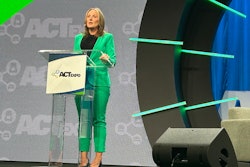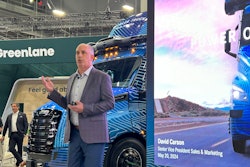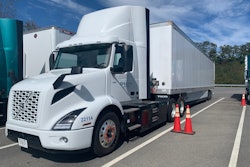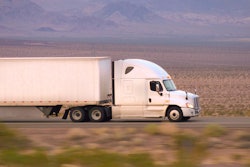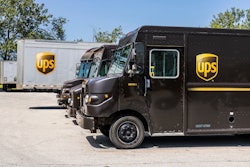Trucking news and briefs for Friday, May 31, 2024:
Einride orders 150 electric Class 8 Peterbilts
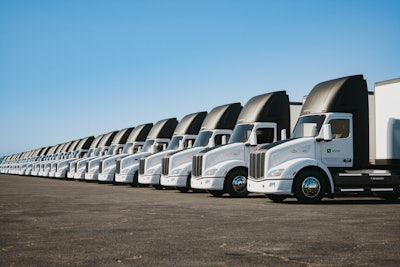 Einride has placed an order for 150 Peterbilt 579EV battery-electric trucks.Peterbilt
Einride has placed an order for 150 Peterbilt 579EV battery-electric trucks.Peterbilt
Peterbilt this week announced its largest electric vehicle order to date –150 Model 579EVs from Einride, a developer of digital, electric and autonomous freight technology. This order will strengthen electric heavy-duty fleets across the US as they are deployed with Einride’s customers, Peterbilt said.
“We are proud to announce this partnership with Peterbilt and Rush Peterbilt Truck Centers as we combine our technology platform with their premium hardware to provide a market leading offering as we collaborate on the future of electric freight,” said Niklas Reinedahl, general manager North America at Einride. “Bringing new technology to market is imperative to enabling the switch to electric freight operations and we look forward to seeing this further scale Einride’s footprint in the market.”
Einride’s turnkey Freight Capacity as a Service solution provides customers a seamless, efficient switch to electric transportation with its ability to integrate electric vehicles, charging infrastructure and Einride Saga, the digital freight platform, the company said.
Since 2020, Einride has been operating electric large-scale fleets, and now, this fleet of Peterbilt electric vehicles will service Einride’s North America customers.
“Peterbilt is a leader in commercial vehicle electrification and offers the industry’s most complete lineup of electric vehicles,” said Jason Skoog, Peterbilt general manager and Paccar vice president. “Our focus on creating reliable zero-emissions solutions enable Einride to electrify end-user fleets and support reducing tailpipe emissions in the transportation industry.”
[Related: Einride opens 65-charger station for L.A. ports]
New York trucking association files lawsuit over congestion tolls
The Trucking Association of New York (TANY) Thursday filed a lawsuit against the Metropolitan Transportation Authority (MTA) over its soon-to-be-implemented congestion pricing framework in New York City, arguing the congestion pricing policy unfairly targets trucking and logistics companies, which are charged far higher rates than passenger vehicles.
Under the finalized plan, trucks would be subject to a charge of $24 or $36 per trip into the congestion zone below 60th Street in Manhattan, depending on their size, compared to just $15 per day for passenger vehicles.
“The MTA’s reckless congestion pricing policy ignores the warnings and counsel of industry experts on both sides of the Hudson, who warn that the discriminatory way trucks and logistics companies are targeted by the plan will increase costs for residents everywhere,” said Kendra Hems, president of the Trucking Association of New York.
While the goal of the plan is ostensibly to reduce vehicle traffic during business hours, the MTA is also required to raise at least $1 billion per year with congestion pricing, per a legislative directive from Albany – meaning the agency is incentivized to maximize revenue by targeting those with inelastic schedules, like trucks. Hems noted MTA's plan "ultimately used our essential, hard-working members as a tool to meet their arbitrary funding requirements.
The trucking industry moves nearly 90% of goods in New York's five boroughs and has delivery schedules set by the businesses they serve, and a 2017 study conducted by the MTA itself found that reducing commercial vehicle tolls in off-peak hours has no impact on vehicle crossing times, underscoring that trucks enter New York City when they have to, not when they want to.
“My drivers would benefit more than most by having less vehicle traffic on the New York City streets, but those drivers have far fewer options – after all, they can’t move heavy freight via the subway or Metro North,” said Joe Fitzpatrick, founder of Lightning Express Delivery Service and vice chair of TANY’s Board of Directors. “As any responsible business does, we deliver when our customers ask us to deliver, which is during prime business hours. That will not change now, but what will change is higher costs for New Yorkers as a result.”
Port of Oakland eyes federal grant for zero-emission transition
The Port of Oakland and a coalition of 20 partners have applied for a federal grant that will fast-track the Oakland Seaport’s conversion to 100% zero-emission cargo handling operations.
The Port and its clean energy partners are seeking a $417 million grant through the Environmental Protection Agency’s Clean Ports Program: Zero-Emission Technology Deployment Competition.
The Port’s proposal is called “Community Led, Business Supported, Proven and Ready to Go! Transforming the Port of Oakland to Zero Emissions.” The project would significantly advance industry and community goals to transition to zero-emissions operations and strengthen longstanding relationships to meet shared goals, the Port said.
The Port is working closely with 20 community-based organizations, workforce development organizations, marine terminals, Port users, and industry leaders on the proposal. It will support emissions reductions and climate adaptation initiatives that will benefit the region’s industry-impacted communities in East and West Oakland, while advancing a community-verified and air district-supported, air-monitoring system to measure project effectiveness and outcomes.
The Port proposes a project cost up to $586 million, to include the replacement of approximately 760 pieces of equipment with zero-emissions (ZE) equipment (battery-electric or hydrogen fuel cell) including:
- 482 drayage trucks
- 179 yard tractors
- 59 forklifts
- 33 front end loaders
- Five reach stackers
- One rail car mover
Another major component of the proposal will be partnering with three local workforce development organizations to support green skills and train drivers on how to operate and maintain the newest zero-emissions equipment and vehicles and supporting infrastructure. In addition, the project includes a Truck Loaner Program, which will provide zero-emissions trucks to independent owner-operators and fleets operating in disadvantaged communities – at no cost to the trucker.
Latest Bendix Fusion system now available on select Kenworth trucks
The latest version of the Bendix Fusion safety technology system is now available on select Kenworth trucks, Bendix announced Wednesday. Bendix Fusion now includes new features and enhanced capabilities, building on long-standing and road-proven advanced driver assistance technologies, the company said.
Bendix Fusion has been available on a growing range of Kenworth models since 2016 and has been standard on select Kenworth trucks – including its on-highway flagship T680 model – since 2018. Built on the foundation of the Bendix ESP Electronic Stability Program full-stability system, Fusion gathers input through radar, video, and brakes, combining and cross-checking the data from sensors that are working together and not just in parallel.
By creating a more detailed assessment from this information, Fusion delivers collision mitigation on moving and stationary vehicles while prioritizing alerts to help reduce driver distraction.
The new Bendix Fusion system features a new radar, which allows the system to add a new feature – ACB Stop and Auto-Go (with pedestrian cancel) and service brake hold. The new radar also allows Bendix to update this generation of Fusion’s key functionalities – autonomous emergency braking (AEB) and stationary vehicle braking. In the cab, drivers will notice new dashboard-integrated messaging designed for even easier understanding.
Like previous versions, the latest Fusion can provide multi-lane AEB, highway departure warning and braking, active cruise with braking (ACB), following distance alerts, lane departure warning, and alerts when speeding.
ACB Stop and Auto-Go is only available with cruise control on and set, according to TJ Thomas, Bendix director of marketing and customer solutions – Controls. If a detected vehicle ahead slows to a stop, the system can automatically de-throttle the engine, activate the engine retarder and apply the service brakes to bring the truck to a full stop.
“ If the forward vehicle resumes moving within a few seconds – and if the system does not detect a pedestrian or object between your truck and that vehicle – your vehicle may accelerate back up to the previously set cruise control speed while maintaining the distance between your vehicle and the one in front of you,” Thomas added
Fusion with ACB Stop and Auto-Go is available on select Kenworth T680 powertrains with automated transmission.
The latest Bendix Fusion also includes a new function: Service Brake Hold. If the system intervenes with service brakes and the truck comes to a full stop, the service brakes will now hold the vehicle at a stop until the driver takes action.





